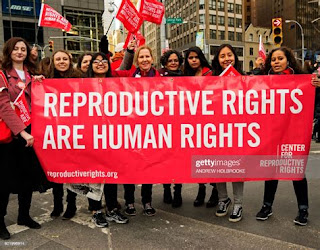E. M. Freese & A. T. Taylor
Salon.com
Originally posted 26 JUL 22
Here is an excerpt:
Morality has thus become the reigning justification for the state to infringe upon the liberty of female Americans and to subjugate their reproductive labor to its power. An interrogation of this morality, however, reveals that it is underpinned by a theology that both erases and assumes the subjugation of female gestational labor in procreation to patriarchy. We must shatter this male-dominant moral logic and foreground female personhood and agency in order for every American to be equally free.
According to Alito, moral concern for "an unborn human being" apparently exempts pregnant people from the right to "liberty" otherwise guaranteed by the 14th Amendment. In other words, the supposed immorality of abortion is weighty enough to restrict bodily autonomy for all pregnant people in this country and to terrorize potentially pregnant females more broadly. This logic implies that pregnant people also lack 13th Amendment protection from "involuntary servitude," contrary to the strong argument made by legal scholar Michele Goodwin in a recent New York Times op-ed. Consequently, the court has now granted permission to states to force pregnant people to gestate against their will.
To be clear, the 13th and 14th Amendments are specifically about bodily autonomy and freedom from forced labor. They were created after the Civil War in an attempt to end slavery for good, and forced reproduction was correctly understood as a dimension of slavery. But Justice Alito asserts that abortion morality puts pregnant bodies in a "different" category with fewer rights. What, exactly, is the logic here?
At its heart, the theological premise of the anti-abortion argument is that male fertilization essentially equals procreation of a "life" that has equal moral and legal standing to a pregnant person, prior to any female gestation. In effect, this argument holds that the enormous female gestation labor over time, which is literally fundamental to the procreation of a viable "new life," can be ignored as a necessary precursor to the very existence of that life. On a practical level, this amounts to claiming that a habitable house exists at the stage of an architectural drawing, prior to any material labor by the general contractor and the construction workers who literally build it.
Abortion opponents draw upon the biblical story of creation found in the book of Genesis (chapters 1-3) to ostensibly ground their theology in tradition. But Genesis narrates that multiple participants labor at God's direction to create various forms of life through a material process over time, which actually contradicts a theology claiming that male fertilization equals instant-procreation. The real political value is the story's presumption of a male God's dominance and appropriation of others' labor for "His" ends. Using this frame, abortion opponents insert a "sovereign" God into the wombs of pregnant people — exactly at the moment of male fertilization. From that point, the colonization of the female body and female labor becomes not only morally acceptable, but necessary.
